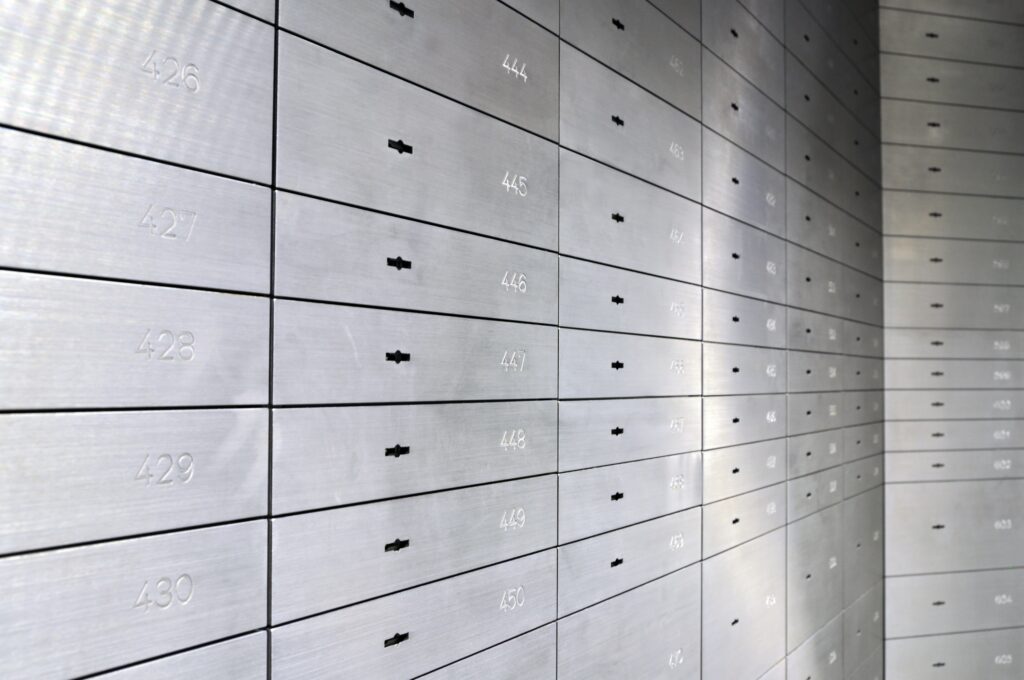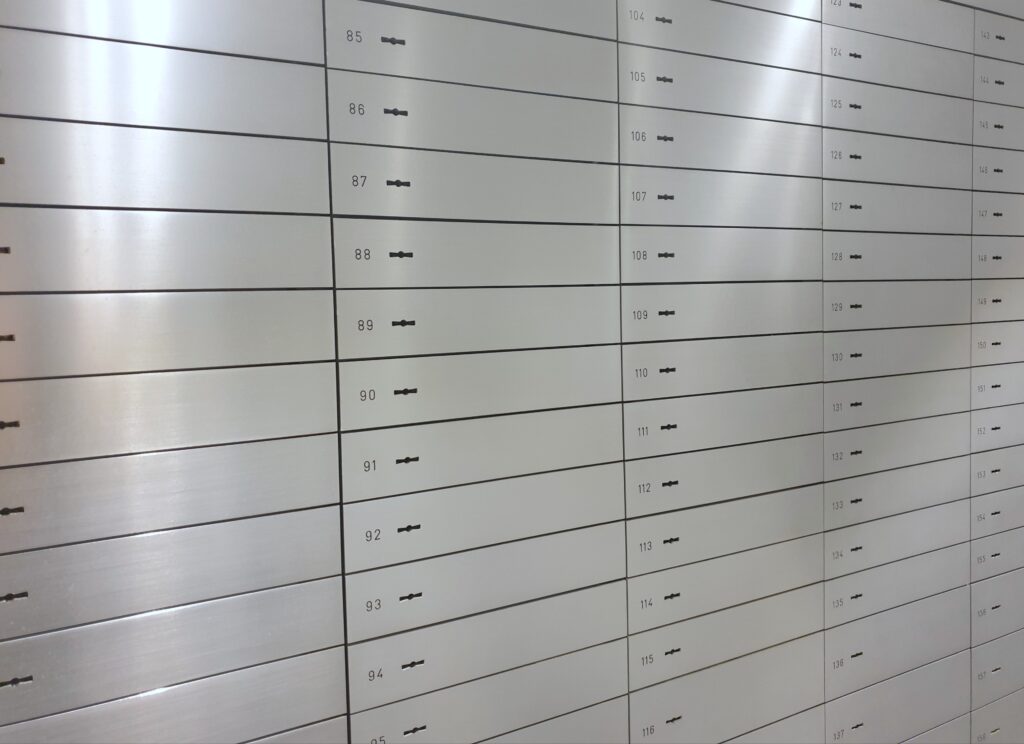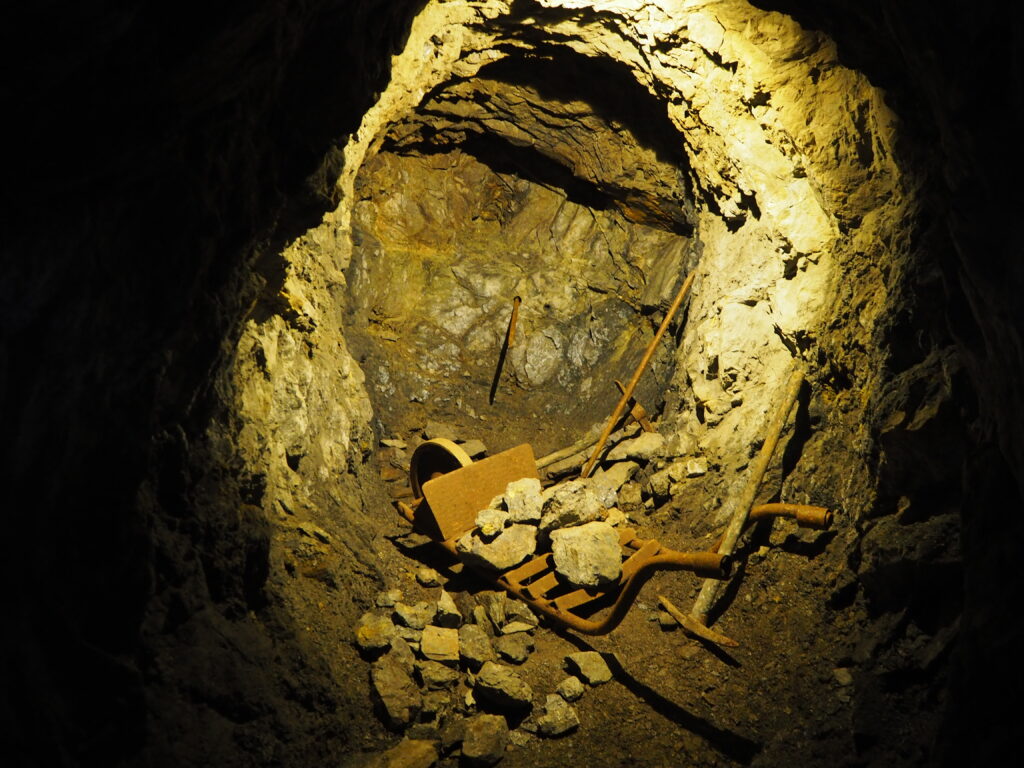Bank-independent storage of precious metals and other valuables
Additional information > Services, clients and facilities > Private precious metal storage instead of a bank
Nowadays, many investors store assets such as cash, stocks and precious metals in bank vaults. Thus relying upon the high-security resources of financial institutions rather than risky home-safe storage. Experts generally recommend spreading investable capital across different assets to minimize potential risk. So why not follow this example with storage too? For example, using bank-independent asset storage facilities.
The strategy of diversification management which governs the deployment of investment products can be similarly applied when it comes to storing gold, silver and other precious metals. Especially in times of crisis, it makes good sense to use alternative asset storage options outside the banking system as a supplementary resource. This became apparent during the coronavirus pandemic crisis back in 2020, when financial institutions could only maintain a limited service for their customers, or even had to close completely. Bank safe deposit box customers thus only had limited access to their deposits during lockdown phases.

© vladk213 - stock.adobe.com
Bank failures can also be problematic. For example, the German financial supervisory authority closed down the globally active Greensill Bank AG in March 2021. As a direct consequence, all customer accounts were immediately frozen. In addition, customers found they could only access their property stored in the bank’s safe deposit boxes via a complex application process.
Banks can struggle to implement the delivery of physical precious metals
So what happens if customers decide to move their precious metals – from their bank to an independent storage facility, for example? According to most banking terms and conditions, this should not be a problem; depending on the contract terms, some financial institutions even guarantee the physical release of bars or coins. That’s what should happen in theory, but the reality of this process can be somewhat different. Most banks can implement these arrangements correctly, and do prioritise customer service. But unfortunately, not every credit institution is prepared to accommodate such requests. There are increasing customer reports of significant delays and stumbling blocks during the process of outsourcing gold and silver holdings.
It’s also important to make it clear these holdings are essentially the legally acquired property of each respective bank customer, and as such they have the right to expect to have their precious metals returned promptly. So all banks should be in a position to hand over these assets within a reasonable time frame. However, gross errors can occur with alarming frequency, with to the result that bank customers have to deal with such unexpected serious cases . Some of the proffered explanations include:
1. Lack of coverage: The precious metal holdings in the customer’s deposit account are not physically backed by the bank, e.g. not physically backed with sufficient amounts, or none of the correct denominations available. When this occurs, the financial institution must first procure the appropriate bars or coins, which can take a lot of time while their internal purchasers look for cheap deals. This can be a particular problem with precious metal accounts, ETFs, ETCs and similar instruments.
2. Inaccuracy: Due to internal errors in precious metal management, not all registered bar numbers assigned to the customer may actually be available. Identifying and correcting such errors can be time-consuming. Meanwhile, the customer is simply left waiting for clarification.
3. Disadvantages of collective storage: When the bank stores its customers’ precious metals in collective custody, the holdings of individual owners may not be clearly assigned. In such circumstances, customers are only entitled to receive back items of equivalent value.
4. The partner safe: This happens when the house bank no longer maintains its own safe facilities and stores its physical precious metals at a partner bank. The administrative response from both banks can be both cumbersome and time-consuming.
5. Delayed authorisation: Complex internal bank hierarchies often prolong the approval process, which is always detrimental to the customer. There is usually a distinct lack of properly qualified staff available to action customer retrievals.
6. Blocking the release: For no apparent reason, the bank’s legal or compliance department, for instance, can raise an objection which then blocks delivery of the precious metal to the customer.
7. Misplaced customer retention initiatives: No bank wishes to lose a customer’s business, and this may significantly delay the release of gold or silver investments. The implied threat of termination of the entire customer relationship may also be used as a pressure tactic to effect the desired outcome.
8. Lack of infrastructure: The bank unexpectedly sets unnecessarily stringent requirements for the delivery of precious metals, such as collection by special valuables transport. This in turn demands further (complex) planning, often generating increased costs for the customer. This can occur when banks no longer have the infrastructure required to handle physical precious metals.
9. Missing tax documents: The online magazines Handelsblatt.de and Focus.de report that a customer of a major Swiss bank has been waiting for the release of 8.5 kilograms of gold since 2014. The customer declined to provide evidence that his gold holding had been correctly taxed in Germany. The bank then terminated its agreement with the customer and withheld the gold, forcing the customer to take the matter to court.
As previously mentioned, these and similar errors do not represent the standard behaviour and response of credit institutions, but do catalogue some notable exceptions. Nevertheless, the storage of precious metals – whether in safe deposit boxes or via storage vaults – is clearly no longer part of the core business of banking institutions. However, the situation is completely different with independent companies such as Swiss Gold Safe, who specialise in storing valuables and have non-bank safe deposit boxes available to rent. In addition, their individual storage provision has many advantages over the collective storage uniformly offered by so many banks: In essence, individual storage ensures each holding is always clearly assigned to the respective customer. Swiss Gold Safe’s service responds promptly and efficiently to client requests, and is carefully designed to avoid unnecessary bureaucracy. You can find out more about this topic and compare the respective benefits of safe deposit boxes and individual storage.
Bank-independent storage of valuables at Swiss Gold Safe
To ensure you never experience any of the potential problems cited above, Swiss Gold Safe has been offering clients bank-independent storage of their physical capital assets since 2006. As a privately run storage company, we provide private and commercial clients from all over Europe with safe deposits sited in purpose-built, high-security facilities. Our specialist services provide for the professional storage of gold and silver investment products as well as many other assets and valuables. In addition, precious metal holdings can also be stored individually.
When you store gold in your safe deposit box, you will enjoy complete privacy because our secure appointment management system ensures clients only enter a secure vault one at a time. You can also use your personal (and insured) safe deposit box to store silver as well as cash and cryptocurrencies. It is also possible to store other valuable assets, such as jewellery, artworks, securities, important documents and data storage devices.
- Find out more about Swiss Gold Safe's bank-independent safe deposit boxes in Switzerland and the Principality of Liechtenstein.

© diez-artwork - stock.adobe.com
Swiss Gold Safe offers clients who cannot attend personally the opportunity to store precious metals in segregated storage. Individual storage is an attractive alternative to a safe or safe deposit box. You can give instructions to have your gold, silver and other white metals stored and/or retrieved at any time.
- Click here to learn more about Swiss Gold Safe's segregated precious metal storage, where you can also arrange VAT-free storage of your silver, platinum or palladium.
No legal reporting requirements for bank-independent storage of valuables
Valuables stored at Swiss Gold Safe are not subject to any legal reporting requirements. The FATCA (Foreign Account Tax Compliance Act) regulations governing the activities of banks and other financial intermediaries do not apply to private storage companies in Switzerland. We are also not obliged to participate in any automatic exchange of information (CRS) with domestic or foreign tax authorities and other such government bodies. Thus, no declaration of contents is required – the nature of the stored goods will be known only to the client.
You don’t need to open a bank account in order to rent a safe deposit box or storage space from Swiss Gold Safe. We offer our customers absolute discretion, and completely anonymous processing. In addition to a range of other common payment methods, you can also pay the annual rent in cash. Thanks to our years of experience in the secure storage of valuables, you can always count on our professionalism and expect total confidentiality at all times.
Switzerland as an independent nation
Although Switzerland sits at the very heart of Europe, it is not part of the European Union (EU) – a crucial advantage for bank-independent precious metal storage. It is in every sense an independent sovereign nation, a fact expressed not least in the continued success of its own currency – the highly stable Swiss franc.

© luzitanija - stock.adobe.com
Furthermore, this democratic state enjoys an enduring worldwide reputation for political and economic stability. Since the end of the Second World War, Switzerland has also played a leading role as a hub for the wholesale trade of physical gold – which is why so many important gold refineries are based in this Alpine democracy.
Switzerland’s long-established unconditional protection of property rights, granted to Swiss residents and foreign citizens alike under Swiss law, is firmly grounded in the nation’s historical traditions. That’s why Switzerland is an astute choice for bank-independent asset storage and the ideal location for the headquarters of Swiss Gold Safe.
A summary of the advantages of bank-independent precious metal storage:
- To minimise risk, investors should diversify the storage of their physical assets, just as they distribute their investments.
- Bank customers repeatedly report problems when retrieving their physical precious metals.
- Storage of gold and silver investments is no longer part of the core business of many financial institutions.
- Privately run, bank-independent storage companies such as Swiss Gold Safe offer a genuine alternative to bank safe deposit boxes.
- Private individuals and business clients can store gold and silver as well as cash, jewellery, securities, artworks, documents and much more in personal safe deposit boxes.
- Individual custody can also be arranged, while the ex-VAT storage of silver and other white-metal investment products is another attractive option.
- Swiss Gold Safe is not subject to any legal reporting obligations to tax authorities or other government bodies. Thus a storage contract requires no bank account and no content declarations.
- As a totally independent, economically stable nation which respects individual property rights, Switzerland is the ideal location for bank-independent precious metal storage.









